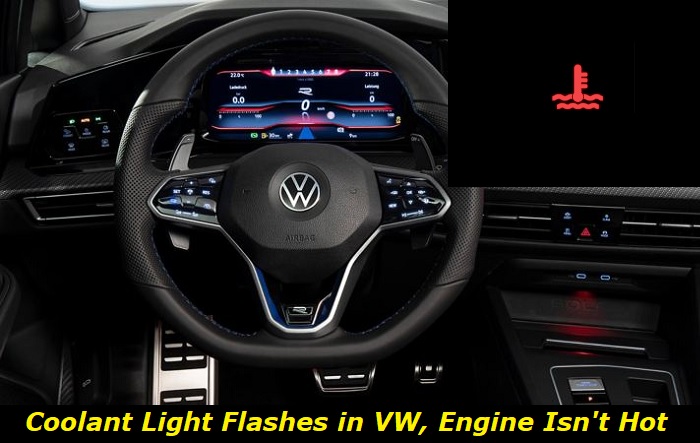Is the coolant light getting on your nerves in your Volkswagen vehicle? We know at least three ways this little light may help you prevent your engine from complete failure. So, don't ignore this. Better find a way to locate the problem and solve it as soon as possible. Otherwise, your vehicle may overheat and the engine will be damaged.
Today, we'll tell you why the coolant light is flashing in your Volkswagen car and the engine is not overheated. Also, we'll tell you what may cause overheating in a VW engine. It's important to understand all the signals that the cooling system of your vehicle shows you. Sometimes, it can save your vehicle and let you keep driving it for years without major issues.

Here's what we are going to talk about:
- Your VW coolant light flashing - what can this mean in a Volkswagen car?
- How can you stop your coolant light from flashing in a VW?
- Why can your Volkswagen engine overheat without you knowing that?
- What can happen to the engine in a Volkswagen if it overheats?
Let's get started!
VW Coolant light flashing but the engine is not hot
If you notice that the coolant light is flashing in red color, you have three possible reasons for this in a VW car: overheating, low coolant level, and also the malfunctioning sensor or wiring. One more possible reason which is not that common is the ECU failure or software glitch. In all these cases, your vehicle is not really safe to drive, so keep reading the article to avoid problems.
If your coolant light is blinking, in most cases, the problem is with the sensor or wiring and the ECU just doesn't get the proper readings of the engine coolant temperature sensor. If the light stays on without blinking, the coolant level or high temperature is the most common reason for a Volkswagen car.
But here are some things you should consider:
- patterns change and we can't say for sure that in all VW cars, a blinking light will always mean that the sensor is broken or the wiring is bad;
- the coolant light never flashes just for some minor issue, it's almost always something serious and you shouldn't ignore it;
- in the majority of VW cars, the coolant light will only go on when the situation is critical and needs immediate reaction on your side;
- always check the engine temperature gauge right when you see the blinking coolant light in your vehicle but don't rely fully on it;
- in some cases, the flashing coolant light will not mean anything bad, just some minor issues with software or temporary glitches;
- you should always double-check the temperature of your engine before you continue driving with a blinking coolant light.
So, ignoring this symptom is not the best option. You can kill your engine eventually if you just don't stop the engine on time. The flashing coolant light in a Volkswagen car is one of the serious issues and driving your vehicle with this symptom is not always safe. We still have some recommendations and tips you can use to avoid spending money on tow trucks.
What to do if you see a blinking coolant light in your Volkswagen?
So, here's the step-by-step guide on what you should do if you encounter this problem in your VW. Just follow these simple steps:
- Find a safe place and stop your vehicle as soon as possible. Then turn off the engine to avoid overheating.
- Turn on the ignition now and look at the engine temperature gauge - the needle should be near the center of the gauge if the car is already warmed up.
- If it's OK, apply your handbrake, open the hood, and look at the coolant reservoir. If your coolant is calm and at a normal level, things are not as bad. But if it's boiling, changing colors, or changing in volume, you are in trouble.
- Let the engine cool down to avoid problems and also to provide it with further checkups. It will take at least 15 minutes if the weather is cool.
- After that, start the engine and see if the coolant light still flashes. If it does, most likely, you are having a problem with the sensor or wiring. If not, the problem was with the engine temperature.
- Now, you need to decide how you can safely take your vehicle to the repair shop or to the dealer.
How can you take your overheated VW to the repair shop?
When the engine in your Volkswagen overheats, it's on the edge of dying. The head may change its shape because it's made of aluminum which hates high temperatures. Also, the pistons may scratch the cylinder walls, the head gasket may be broken, the engine may get stuck, etc. Any of these consequences won't be good for your vehicle.
So, taking your car to the shop just by carefully driving it is not an option. Here are some ideas for you:
- Call a tow truck
This is one of the most expensive solutions but it's the safest one for your vehicle. The tow truck will take the car exactly where you want to have it inspected and repaired without starting its engine.
- Ask someone else to tow your VW
You may find a truck owner who will be glad to help you for some money or just because they are a good person. But there is a problem: towing the majority of modern vehicles is not recommended because of their automatic transmissions. Volkswagen may have a traditional automatic transmission and towing is prohibited for them. While DSG transmissions allow towing.
- Call a mobile service or road assistance
Sometimes, it's really a good idea to use roadside service, especially if you have access to such services with your insurance or with the warranty from your Volkswagen dealership. Roadside assistance will quickly find the reason for this issue and will help you repair your car right where you are without towing it to the shop.
- Drive your vehicle after it's cool
You may start the engine and drive the car once the engine is cool again. But be careful and always look at the temperature gauge. Once you notice that the needle went over half of that gauge, stop the car and let it cool down again. This may take you long to get to the repair shop, but this is the cheapest way to do this.
Why can your VW overheat?
First of all, you should remember that your coolant light may be on because of sensor issues or wiring problems which usually cause the light to blink. And this doesn't mean that the coolant in your engine is too hot. But it means that you can't see how hot the engine actually is. And it may be dangerous if suddenly your car overheats.
But in other cases, when your VW actually overheats, it may happen because of the following reasons:
- thermostat failure - the thermostat turns the coolant flow between small and large circles, so if it gets stuck on the small circle, the engine will overheat and you will not be able to help;
- low coolant level - this is one of the reasons why the coolant light may be flashing, and this also may cause overheating in your VW car;
- the quality of coolant - sometimes, problems happen because of the low coolant quality when it's old or just bad;
- the radiator is clogged - when there is some blockage in the cooling system, the coolant can't circulate as it should and this may cause overheating;
- water pump damage - if the pump is broken, it will not pump coolant at all, so the engine will overheat immediately, and driving such a car is not safe at all;
- engine problems - if your engine is broken, it may create strong friction between parts which will cause overheating, also low oil level may cause this.
Now you know that there are quite a lot of reasons why your Volkswagen engine may overheat. In some cases, you can still drive but watch the needle on that coolant temperature gauge. But in some other cases, driving is not an option because you can damage your engine.
Can you replace the coolant temperature in a Volkswagen by yourself?
Unfortunately, most of our readers will have the needed tools and experience to replace the coolant sensor in a Volkswagen car. This is certainly not a DIY task because you will give up even when trying to locate it. The sensor may be located in different places in various engines. Also, taking it off the engine may result in coolant leaks directly on some electronic blocks under the hood of your car.
So, we would pay a professional for engine coolant temperature sensor replacement. This is not going to cost you a fortune and it will only take about half an hour if the new sensor is available at the store. Remember that driving with a broken engine temperature sensor may kill your Volkswagen engine.
About the authors
The CarAraC research team is composed of seasoned auto mechanics and automotive industry professionals, including individuals with advanced degrees and certifications in their field. Our team members boast prestigious credentials, reflecting their extensive knowledge and skills. These qualifications include: IMI: Institute of the Motor Industry, ASE-Certified Master Automobile Technicians; Coventry University, Graduate of MA in Automotive Journalism; Politecnico di Torino, Italy, MS Automotive Engineering; Ss. Cyril and Methodius University in Skopje, Mechanical University in Skopje; TOC Automotive College; DHA Suffa University, Department of Mechanical Engineering






Add comment